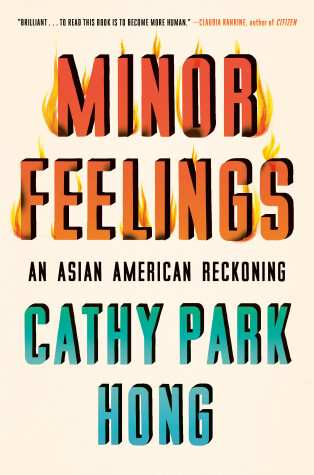
NEW YORK TIMES BESTSELLER • PULITZER PRIZE FINALIST • NATIONAL BOOK CRITICS CIRCLE AWARD WINNER • ONE OF TIME’S 100 MOST INFLUENTIAL PEOPLE • A ruthlessly honest, emotionally charged, and utterly original exploration of Asian American consciousness
“Brilliant . . . To read this book is to become more human.”—Claudia Rankine, author of Citizen
In development as a television series starring and adapted by Greta Lee • One of Time’s 10 Best Nonfiction Books of the Year • Named One of the Best Books of the Year by The New York Times, The Washington Post, NPR, New Statesman, BuzzFeed, Esquire, The New York Public Library, and Book Riot
Poet and essayist Cathy Park Hong fearlessly and provocatively blends memoir, cultural criticism, and history to expose fresh truths about racialized consciousness in America. Part memoir and part cultural criticism, this collection is vulnerable, humorous, and provocative—and its relentless and riveting pursuit of vital questions around family and friendship, art and politics, identity and individuality, will change the way you think about our world.
Binding these essays together is Hong’s theory of “minor feelings.” As the daughter of Korean immigrants, Cathy Park Hong grew up steeped in shame, suspicion, and melancholy. She would later understand that these “minor feelings” occur when American optimism contradicts your own reality—when you believe the lies you’re told about your own racial identity. Minor feelings are not small, they’re dissonant—and in their tension Hong finds the key to the questions that haunt her.
With sly humor and a poet’s searching mind, Hong uses her own story as a portal into a deeper examination of racial consciousness in America today. This intimate and devastating book traces her relationship to the English language, to shame and depression, to poetry and female friendship. A radically honest work of art, Minor Feelings forms a portrait of one Asian American psyche—and of a writer’s search to both uncover and speak the truth.
Praise for Minor Feelings
“Hong begins her new book of essays with a bang. . . .The essays wander a variegated terrain of memoir, criticism and polemic, oscillating between smooth proclamations of certainty and twitches of self-doubt. . . . Minor Feelings is studded with moments [of] candor and dark humor shot through with glittering self-awareness.”—The New York Times
“Hong uses her own experiences as a jumping off point to examine race and emotion in the United States.”—Newsweek
“Powerful . . . [Hong] brings together memoiristic personal essay and reflection, historical accounts and modern reporting, and other works of art and writing, in order to amplify a multitude of voices and capture Asian America as a collection of contradictions. She does so with sharp wit and radical transparency.”—Salon
I usually like it when the authors of social justice books include bits of themselves and their lives in their work. Unfortunately, Cathy Park Hong is not a person who I enjoyed spending time with, as her own choices about what to share about herself reveal her to be insufferable and narcissistic. She is a MFA poet and artist so she and I are already in opposing circles in life. She quotes other poets' critical analysis liberally and gushes about absolutely obnoxious modern art (a friend of hers sat on a chair and dug a hole in the ground with her shoes and this was apparently brilliant art worth recounting fondly).
So I was already primed to be annoyed with her, but every story she tells about herself made her look terrible. She starts off the book admitting to relentlessly stalking a therapist who did not want to take her on as a client. When talking about her awful, exhausting, highly dramatic and volatile college friends, she relays a conversation she had with one while writing this book where she wanted to include information about the friend's traumatic past, and the friend didn't want her to. She admits to pressing her friend and arguing with her and trying to get her friend to relent - and it just seemed so bonkers to me that in a book that criticizes Whiteness and the Western world for colonizing and stealing from other countries, she wanted to colonize and steal from her friend's past AND SHOWED NO AWARENESS OF THIS IRONY. While she seemed to look back at the therapist incident and somewhat acknowledge it was not her finest moment, she showed zero embarrassment about pressuring her friend. And in a third chapter, she wanted to write about an author's rape and murder and stated that she had been told that there wasn't much reporting on it already because no one wanted to re-traumatize the family. So what does she do? Calls up the family and asks them questions about their loved one's rape and murder! She claims that the family member she spoke to was happy to talk to her, but given her pattern here I am not sure how reliable that statement is.
Ultimately, it was jarring to read a book about oppression and social justice and come away with so many examples of the author taking from others (even more ironically, all three examples were other Asian Americans she was taking from) to enrich herself.
Reading updates
-
Started reading
-
11 June, 2022:
Finished reading
-
11 June, 2022:
Reviewed
